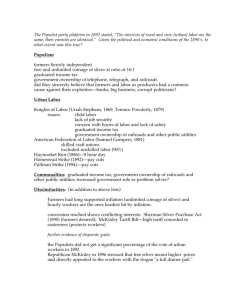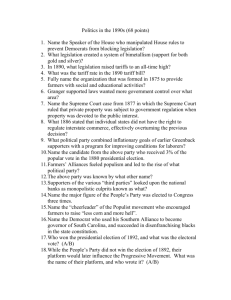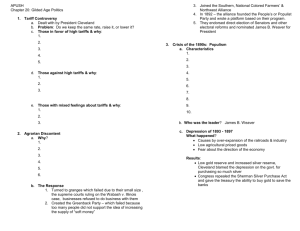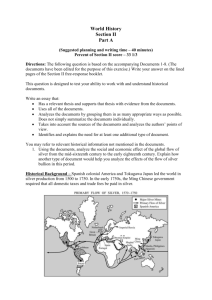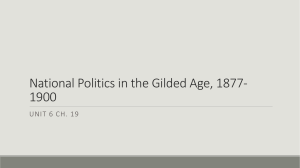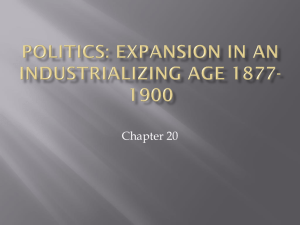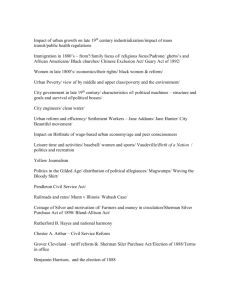Chapter 20
advertisement
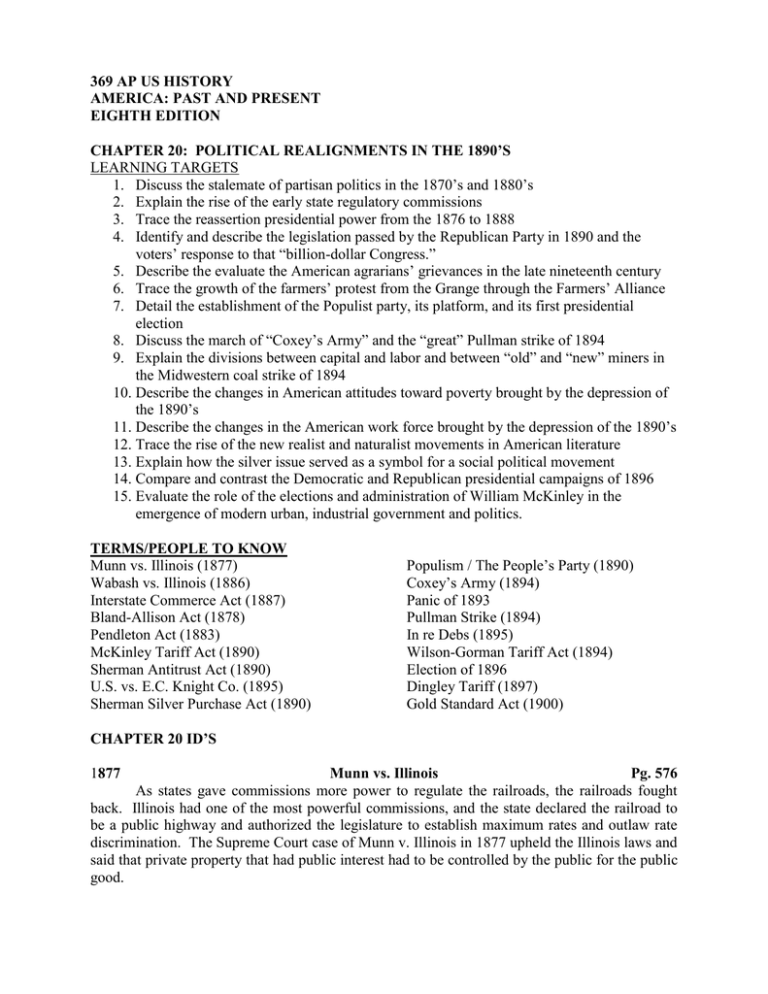
369 AP US HISTORY AMERICA: PAST AND PRESENT EIGHTH EDITION CHAPTER 20: POLITICAL REALIGNMENTS IN THE 1890’S LEARNING TARGETS 1. Discuss the stalemate of partisan politics in the 1870’s and 1880’s 2. Explain the rise of the early state regulatory commissions 3. Trace the reassertion presidential power from the 1876 to 1888 4. Identify and describe the legislation passed by the Republican Party in 1890 and the voters’ response to that “billion-dollar Congress.” 5. Describe the evaluate the American agrarians’ grievances in the late nineteenth century 6. Trace the growth of the farmers’ protest from the Grange through the Farmers’ Alliance 7. Detail the establishment of the Populist party, its platform, and its first presidential election 8. Discuss the march of “Coxey’s Army” and the “great” Pullman strike of 1894 9. Explain the divisions between capital and labor and between “old” and “new” miners in the Midwestern coal strike of 1894 10. Describe the changes in American attitudes toward poverty brought by the depression of the 1890’s 11. Describe the changes in the American work force brought by the depression of the 1890’s 12. Trace the rise of the new realist and naturalist movements in American literature 13. Explain how the silver issue served as a symbol for a social political movement 14. Compare and contrast the Democratic and Republican presidential campaigns of 1896 15. Evaluate the role of the elections and administration of William McKinley in the emergence of modern urban, industrial government and politics. TERMS/PEOPLE TO KNOW Munn vs. Illinois (1877) Wabash vs. Illinois (1886) Interstate Commerce Act (1887) Bland-Allison Act (1878) Pendleton Act (1883) McKinley Tariff Act (1890) Sherman Antitrust Act (1890) U.S. vs. E.C. Knight Co. (1895) Sherman Silver Purchase Act (1890) Populism / The People’s Party (1890) Coxey’s Army (1894) Panic of 1893 Pullman Strike (1894) In re Debs (1895) Wilson-Gorman Tariff Act (1894) Election of 1896 Dingley Tariff (1897) Gold Standard Act (1900) CHAPTER 20 ID’S 1877 Munn vs. Illinois Pg. 576 As states gave commissions more power to regulate the railroads, the railroads fought back. Illinois had one of the most powerful commissions, and the state declared the railroad to be a public highway and authorized the legislature to establish maximum rates and outlaw rate discrimination. The Supreme Court case of Munn v. Illinois in 1877 upheld the Illinois laws and said that private property that had public interest had to be controlled by the public for the public good. 1886 Wabash v. Illinois Pg. 576 The Wabash case weekend the Munn ruling by saying that states could not regulate commerce outside their own borders. That was Congress’ job. As a result of the Wabash decision, the federal government established the Interstate Commerce Commission to investigate the railroads and oversee their activities. 1887 Interstate Commerce Act Pg. 576 As a result if the Wabash decision, the federal government passed the Interstate Commerce Act in 1887. It established the ICC outlawed rebates and pooling agreements. 1878 Bland-Allison Act Pg. 576 Hayes’ presidency was constantly under a cloud of doubt because of the controversial election of 1876. Hayes was committed to the gold standard, and to that end, he vetoed the Bland-Allison Silver Purchase bill. The bill called for the partial coinage of silver. Although Hayes vetoed it, Congress still passed it. 1883 Pendleton Act Pg. 577 Garfield’s successor to the presidency was Chester A. Arthur. Arthur turned out to be a better president that anyone expected. He got many things accomplished. One of those was the passing of the Pendleton Act in 1883. The Pendleton Act’s purpose was to reform the civil service. It created a bipartisan Civil Service Commission to give competitive tests and appoint officeholders on the basis of merit. 1890 McKinley Tariff Act Pg. 578 In the election of 1888, the Republicans gained control of both houses of Congress. The Democrats used the disappearing quorum rule to prevent Congress from doing anything. They would debate, and then refuse to vote so Congress wouldn’t have a quorum. On Jan. 29, 1890, Speaker of the House, Thomas B. Reed told the clerk of the House to record the names of representatives refusing to vote so that a bill could be passed. After that, the Republican Congress did a lot. One of those bills was the McKinley Tariff Act. It raised tariff duties 4%, allowed the president to lower tariffs in response to the same happening in other countries, and used the revenues to help industry. 1890 Sherman Antitrust Act Pg. 578 Another act passed by the Republican Congress was the Sherman Antitrust Act. It declared anything that would restrain commerce illegal. These included trusts, monopolies, pools, and many other common business practices of the day. The penalties for violation were high. It was an experimental law so it was very vague in some parts and very open to interpretation. It was the first time any country had tried to regulate big business. 1895 U.S. v. E.C. Knight Co. Pg. 578 After the Sherman Antitrust Act was passed, the Supreme Court weakened the law with the case of U.S. v. E.C. Knight Co. The Supreme Court said that the Antitrust Act applied only to commerce and not to manufacturing. This meant that it didn’t apply to people like Carnegie and Rockefeller. 1890 Sherman Silver Purchase Pgs. 578 Silver had always been a problem in the U.S. Silver had been one of the two precious metals that currency was based on. After the huge silver finds in Nevada, silver production skyrocketed, and filled the world market. European countries switched their currency to the rarer gold. People in the South and West supported a U.S. silver currency while the North and East were against it. Harrison took the middle road with the passage of the Sherman Silver Purchase. It said that the Treasury would buy 4.5 million ounces of silver a month and issue Treasury notes to pay for it. It didn’t give free coinage of silver, yet it did buy up most of the country’s silver production. The Treasury notes could be redeemed in either gold or silver. Populism/The People’s Party Pg. 582 Between 1870 and 1890, farmer discontent was a growing problem in the U.S. The farmers saw many problems with their position like falling crop prices, a decrease in their condition, and widely varying income. Many of their complaints were exaggerated or completely false. Originally, the Farmers’ Grange was created to help farmers deal with their problems. As it turned to politics, the Grange died out. It was replaced by the National Farmers’ Alliance in the North and the Southern Alliance in the South. In 1889, the Southern Alliance took over the Alliance movement. The Alliance in the west started its own political party while the Southern Alliance tried to gain control of the Democratic Party. Two men rose up to the lead the Alliance. Thomas E. Watson and Leonidas L. Polk led a meeting in Ocala, Florida. In Ocala, the Alliance adopted the Ocala Demands that became its platform. The biggest demand was that the government create a sub-treasury in which farmers would store their crops in government warehouses. After the elections of 1890 in which the Alliance won a great amount of influence in the government, the organization decided to create a new political party. In 1892, at a convention in Omaha, Alliance leaders created the People’s Party. The People’s Party brought together whites and blacks in the South and formed a strong political party. In the elections of 1892, the Populist candidate, James B. Weaver, lost by a lot, and the Populists were written off. Many of the party’s ideas were later espoused and put into action by the major parties. 1890 1893 Panic of 1893 Pg. 583 As soon as Grover Cleveland became president, the Panic of 1893 hit the U.S. The economy had expanded too rapidly and collapsed on itself. Railroads had overbuilt, businesses had overextended their markets, and farms and businesses had borrowed heavily. Business sagged and consumer confidence died. The stock market crashed. In 1894, a drought and heat wave in the Midwest killed crops and cotton prices bottomed out. Unemployment reached 20%. 1894 Pullman Strike Pgs. 584-85 The Panic of 1893 caused many strikes as the jobless tried to get work, and the employees tried to get money to survive. One of the biggest strikes was the Pullman Strike of 1894. The employees of the Pullman Palace Car Company, living in a company town, struck. The American railway Union joined them by refusing to handle any trains that carried Pullman cars. The strike threw the nation into chaos and stopped the economy. Cleveland decided to end the strike with a court injunction and ordered troops into Chicago. Violence broke out and Eugene Debs, the leader of the ARU was arrested. 1880’s-1890’s 1895 Horatio Alger Pg. 589 In re Debs Pgs. 585 After Debs was arrested for the violence following the court injunction for the ARU to go back to work, the Supreme Court upheld his sentence in In re Debs. The Supreme Court endorsed the used of the injunction to end strikes, giving business a great advantage. 1894 Wilson-Gorman Tariff Act Pg. 587 One of the promises that the Democrats had made when they came into power in 1890 was to reduce the tariff. The Wilson-Gorman Tariff Act in 1894 was supposed to achieve that end. It reduced the tariff on coal, iron ore, wool, and sugar, while raising other tariffs. It repealed the McKinley Tariff’s provision that the U.S. would lower tariffs in response to like action by other countries. It also imposed a small income tax that the Supreme Court overturned in 1895. 1896 Election of 1896 Pg. 590-91 During the election of 1896 Republican William McKinley ran against Democrat William Jennings Bryan. McKinley ran on a pro-gold platform. The Democratic party was split, but pro-silver members took control and the party took hold in the South and became a sectional party once again. Bryan ran on a pro-silver platform. The People’s party didn’t know what to do, so it nominated Bryan for president and Tom Watson for VP. The press deserted Bryan so he took his campaign directly to the people. McKinley brought voters into Ohio, his hometown and spoke to them from his front porch. McKinley won. The Populists were crushed and died out. 1897 Dingley Tariff Pg. 696 Shortly after McKinley became president, he called a special session of Congress to work on the tariff. In July of 1897, Congress passed the Dingley Tariff. The tariff raised duties to a record level. It caused problems for the Republican Party because people began to wonder how necessary a tariff really was. 1900 Gold Standard Act Pg. 607 Fulfilling his campaign of pro-gold, McKinley passed the Gold Standard Act in 1900 that put the U.S. on the gold standard with the rest of the world. THE BIMETALLIC DEBATE I. THE POLICY Bimetallism—Since its beginnings, the United States government had adopted a policy of backing its money with both gold and silver at a fixed ratio. Under this policy of bimetallism, it was, in the early 1870’s, coining gold and silver without charge at a ratio of 16 oz. of silver to one oz. of gold (free and unlimited coinage at 16 to 1). II. THE STORY A. Segments of U.S. society want cheap money: Segments of U.S. society want hard money: B. DEMONITIZATION OF SILVER: For many years before 1873, sliver miners had stopped bringing their silver to the Mint for coinage because they could get a higher price for it from the silversmiths on the “market” than they received from the government. Since facilities for coining silver were lying unused, the government quietly stopped coining or “demonetized” silver dollars in 1873. C. THE “CRIME OF ‘73”: In the mid-1870’s, large silver deposits were discovered and mined in Nevada (Comstock Lode) and Colorado. As silver poured onto the market, its value decreased rapidly. When miners who had formerly sold their silver to commercial outlets, tried to sell it to the Mint they became painfully aware that silver had been demonetized. They now demanded that the government resume free and unlimited coinage of silver, and denounced the demonetization act as the “Crime of ‘73”. Farmers joined the silver miners because they were convinced that free silver would raise farm prices. D. PANIC OF 1873: CAUSES: Overexpansion of railroads and industry Granting of unsound back loans Insufficient farm purchasing power because of low agricultural prices: drought, oversupply Economic distress in Europe SOLUTION:--? Reissue soft money (greenbacks) or remonitize silver (Suggestion: Wouldn’t this make the panic less severe asked farmers and manufacturers?) --? Eventually the economy will recover on its own if it is allowed to do so. Stick with the “sound money” policies so that when recovery does come, the country will be solidly on firm ground with a Gold Standard (to match the standard set by its other major world trading partners). E. RESUMPTION ACT OF 1875: In 1866 the Federal Government began to withdraw unbacked paper currency (which had been issued during the Civil War) called Greenbacks. Farmers and expansionist minded manufacturers were angered because this meant they would have to repay their mortgage debts in dollars worth more than those they had originally borrowed. Grant vetoed an 1874 Congressional authorization of new greenbacks and then further antagonized the newly formed Greenback Party (officially organized in 1876) by enacting the SPECIES RESUMPTION ACT OF 1875: After 1879 the government would redeem greenbacks dollars at par with gold; that is, the present greenbacks, whose value constantly fluctuated, could be exchanged for new paper currency, whose value would be firmly pegged to the price of gold. Result = inflation. THE REALITY: The gold-based money supply was never able to expand as much as some segments of society believed was necessary. Farmers, laborers, some manufacturers—and debtor regions—the South and the West—continued to clamor for a currency based not on gold reserves but on the productive capacity of the nation. Otherwise, they claimed they would continue to be strangled by an overvalued dollar circulating in insufficient quantities. These malcontents questioned if this issue--maintenance of the gold standard was conspiracy by entrenched financiers to keep them in economic bondage, in other words to make them SLAVES. F. THE SILVER PURCHASE ACTS BLAND-ALLISON ACT (1878)—To meet the demands of the “silverites” this act provided for the purchase by the Treasury Department, for coinage in to silver dollars in 2-4 million dollars’ worth of silver bullion each month. When this failed to halt the decline in the value of silver Congress passed the SHERMAN SILVER PURCHASE ACT (1890)—Increased government silver purchases to 4.5 million oz. per month. Payment for such silver to be made in legal tender treasury notes, redeemable in gold or silver. Initial Reaction: The North and East are happy because “free coinage” of all silver didn’t happen. The South and West are happy because this is a gesture toward a bimetallic economy. The Problem: Everyone wants redemption of their Silver Certificates in gold creating a run on the gold reserves, destabilizing the soundness of the dollar internationally and by 1893 prolonging the depression. G. PANIC OF 1893 CAUSES: Overexpansion of the railroads and industry Continued low agricultural prices Fear among businessmen for the stability of our currency, due to shrinking of the gold reserve and the battle of a bimetallic currency. CLEVELAND’S SOLUTION: 1893--Congress repealed the Sherman Silver Purchase Act 1895--Directed the treasury to borrow a large sum of gold from J.P. Morgan (large Eastern backing syndicate). Because the bankers made a large profit on the sale of the government bonds they received in exchange for the gold, Cleveland was bitterly denounced by the Western and Southern wings of this Democratic Party as a “tool of Wall Street.” III. PERCEPTION IS REALITY—ELECTION OF 1896 DEMOCRATS AND POPULISTS Farmers and industrialists came to believe that Eastern Industrialists and bankers controlled both the Democratic and Republicans parties. They formed the Populist Party. Other “silver interests”--laborers and that only Cleveland had “sold out” to Eastern interests. Both Populists and Democrats nominated Wm. Jennings Bryan who delivered an emotional attack upon the Gold Standard in his famous “Cross of Gold” speech: “YOU WILL NOT LAY UPON THE BROW OF LABOR THIS CROWN OF THORNS; YOU WILL NOT CRUCIFY MANKIND UPON A CROSS OF GOLD.” REPUBLICANS Conservative Eastern industrial and banking interests controlled the Republican convention. They nominated the skillful Ohio politician William McKinley, who opposed free silver, supported the gold standard, and advocated high protective tariffs. IV. THE RESULTS This campaign was among the most spectacular of the 19th century. Historians have contended that Bryan made a spectacular effort against the odds: McKinley spent $4 million on his campaign while Bryan spent $300,000. McKinley’s campaign manager alerted his friends to warn workers and mortgagors that, if Bryan were elected, they would lose their jobs and farms. McKinley’s managers sent 1,200 professional public speakers across the country to remind voters of the economic necessity of a Republican presidency. Millions of dollars poured into the McKinley campaign, some contend as much as 10 times the amount Bryan had to work with. McKinley also benefited from the almost unanimous support of the press, which ridiculed Bryan as a radical, irresponsible “boy orator.” McKinley carried all the industrial states and even won the older agrarian states. McKinley had ½ million more popular votes than Bryan. With 271 electoral votes to Bryan’s 176, McKinley won the election. THE END: The Bi-metallic Debate dies by 1897-1900 (the beginning of the end of the Depression) 1) GOLD STANDARD ACT OF 1900—declared gold the standard to back the currency of the U.S.; ends the silverite controversy. 2) GOLD TECHNOLOGY—New ways to extract small veined gold deposits were discovered and added to the amount of gold in circulation caused by the Alaska Gold Rush. 3) DINGLEY TARIFF—Highly protectionist tariff (Tariff are at an all time high) PRESIDENTIAL ADMINISTRATIONS 1863 ANDREW JOHNSON (R) Acquitted of impeachment charges Alaska Purchased from Russia (1867) 1869 ULYSSES S. GRANT (R) Spoils System vs. Civil Service debated First transcontinental railroad completed 1869 Scandals = Credit Mobilier, Whiskey Ring [Tweed Ring in New York exposed] Panic of ‘73/Specie Resumption Act of 1879 “Waving the Bloody Shirt” 1877 RUTHERFORD B. HAYES (R) “His Fraudulency” Republican Party divide into two powerful factions = the STALWARTS and the MUGWUMPS/HALF-BREEDS Bland-Allison Act 1878 1881 JAMES GARFIELD (R) “Dark Horse” Assassinated after 4 months in office (by Charles A. Guiteau, a jobless and mentally disturbed STALWART) 1881 CHESETER A. ARTHUR (R) Pendleton Act (presently covers 90% of all government jobs) 1885 GROVER CLEVELAND (D) Honest Reputation-A Reformer “A public office is a public trust” Pushed for lower tariffs but Congress would not pass it ICC and AFL Formed Haymarket Affair Dawes Act (1887) 1889 BENJAMIN HARRISON (R) Sherman Anti-trust Law (1890) McKinley tariff (1890) Sherman Silver Purchase Act (1890) Wage Cuts become prevalent Populist Party formed 1893 GROVER CLEVELAND (D) Panic of 1893-(Cleveland repeals Sherman Silver Act this year) Push for a Bimetallic Standard Wilson Gorman Tariff of 1894-resulted in a minor reduction and an income tax on large incomes was ruled unconstitutional by the Supreme Court. 1897 WILLIAM MCKINLEY (R) Spanish-American War 1898 Dingley Tariff of 1897-raised the average tariff duties to an all time high Gold Standard Act of 1900-declared gold the standard for U.S. currency and effectively ended the bimetallic debate Assassinated in the beginning of his 2nd term by 28 year old Leo Czolgosz, a 28 year old unemployed laborer and anarchist who shot him in the head while going through a receiving line Theodore Roosevelt becomes the youngest president at the age of 41 1901 THEODORE ROOSEVELT (R) Use of the Sherman Anti-Trust for its lawful purpose Hepburn Act of 1906 (Strengthened the ICC) Pure and Food Drug Act Conservationist Movement Launched Newlands Reclamation Act (1902) Panic of 1907 (through 1914) 1909 WILLIAM HOWARD TAFT Payne-Aldrich Tariff Bill (1909) Pinchot-Ballinger Affair (TR runs against Taft on NEW NATIONALISM platform) 1913 WOODROW WILSON (D) Underwood Simmons tariff (1913) Sixteenth (Income Tax) and Seventeenth (Direct Election of Senators) Amendments Passed (1913) Federal Reserve Act (1913) Federal Trade Commission Act (1914) Clayton Anti-Trust Act (1914) Keating-Owen Act (1916)
